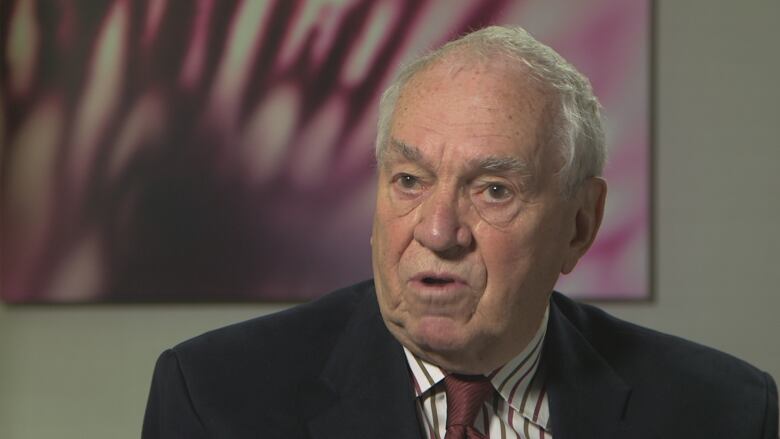Broadbent summit gathers progressives amid questions about NDP's future
Former leader encourages party to 're-establish itself as the driver of political debate'

Former NDP leader Ed Broadbent opened his eponymous think-tank's annual "progress summit" this morning with a message that "progressive ideas are on the move here at home and all over the world," despite his party's crushing loss in last October's federal election.
Broadbent steered clear of commenting on the fate of Tom Mulcair's leadershipon the occasion of April Fool's Day he teased his own run at the NDP leadershipbut he encouraged the NDP to "re-establish itself as the driver of political debate in the House of Commons."
- NDP election post-mortem finds party's strategy 'out of sync' with Canadians
- Mulcair's support down from pre-election high among NDP voters as he faces leadership vote
- Mulcair gains support from union leaders ahead of leadership vote
The Broadbent Institute's annual conference openedFridaymorning in Ottawa, and Broadbent was followed to the stage by the legendaryfeminist activist Gloria Steinem, invited to discuss the "intergenerational fight for equality."
Other speakers include:
- Child welfare activist Cindy Blackstock.
- Ontario NDP Leader Andrea Horwath.
- B.C. NDP Leader John Horgan.
- Alberta Environment Minister Shannon Phillips.
- U.K. Labour MPChi Onwurah.
- American economist James Galbraith.
As well, two federal Liberals are scheduled to appear:Environment Minister Catherine McKenna and Adam Vaughan, parliamentary secretary to the prime minister.
Alex Himelfarb, a former clerk of the Privy Council, and Conservative MP Michelle Rempel will participate in a debate on proportional representation. And organizers for Hillary Clinton and Bernie Sanders, the two candidates vying to represent the Democratic Party in this fall's U.S. presidential election, will appear alongside each other in a sessionon Fridaynight.
Mapping the best way forward
The summit, which typically draws a crowd of NDP supporters and officials, takes place a week before federal New Democrats meet in Edmonton to discuss last fall's election result and contemplate how the party will move forward, with the question of Mulcair's leadership foremost among the issues up for debate.
The future of the federal party will no doubt be a topic of discussion in the hallways, even if the formal program deals with larger issues of public policy like health care, infrastructure and climate change.
Broadbent pointed to the recent successes of progressive politicians and ideas internationally and in Canada, but acknowledged that "there can be no doubt that for New Democrats the election results were disappointing, especially compared to what at one time we all thought seemed possible."
Broadbent posited that "the Liberal Party turned left in good measure because popular support for the NDP was strong" and he argued that the NDP must now aim to drive the political conversation from the left.
The party's elder statesman also dismissed any lingering debate about whether the NDP should prioritize its principles or the pursuit of power.
"There often arises among us on the left, to be quite candid, most often in the wake of electoral disappointment, a sterile debate as to whether the best way forward is through bold ideas on the one hand or professionalized electoral techniques on the other. I want to say, for me, that this is not and never has been the relevant question," he said. "We need to root our activism in both bold progressive ideas and in ways to improve our appeal to the broad majority of Canadians."
Broadbent says his institute will focus for the next year on nurturing and promoting those ideas. In the meantime, he says, progressives should focus on two issues: pushing the Liberal government to implement proportional representation and reforming the tax code to provide the federal government with the revenue necessary to fund expanded health care, implement child care and transition to a clean economy.












_(720p).jpg)


 OFFICIAL HD MUSIC VIDEO.jpg)
.jpg)



























































































